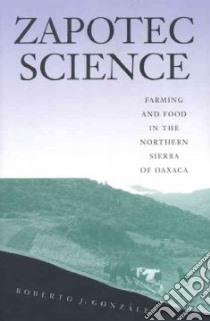- Libreria
- >
- Libri in lingua
- >
- Agricoltura
- >
- Scienze agrarie
Zapotec Science - 9780292728325
Un libro in lingua di Gonzalez Roberto J. edito da Univ of Texas Pr, 2001
- € 33.40
- Il prezzo è variabile in funzione del cambio della valuta d’origine
Zapotec farmers in the northern sierra of Oaxaca, Mexico, are highly successful in providing their families with abundant, nutritious food in an ecologically sustainable fashion, although the premises that guide their agricultural practices would be considered erroneous by the standards of most agronomists and botanists in the United States and Europe. In this book, Roberto Gonzlez convincingly argues that in fact Zapotec agricultural and dietary theories and practices constitute a valid local science, which has had a reciprocally beneficial relationship with European and United States farming and food systems since the sixteenth century.Gonzlez bases his analysis upon direct participant observation in the farms and fields of a Zapotec village. By using the ethnographic fieldwork approach, he is able to describe and analyze the rich meanings that campesino families attach to their crops, lands, and animals. Gonzlez also reviews the history of maize, sugarcane, and coffee cultivation in the Zapotec region to show how campesino farmers have intelligently and scientifically adapted their farming practices to local conditions over the course of centuries. By setting his ethnographic study of the Talea de Castro community within a historical world systems perspective, he also skillfully weighs the local impact of national and global currents ranging from Spanish colonialism to the 1910 Mexican Revolution to NAFTA. At the same time, he shows how, at the turn of the twenty-first century, the sustainable practices of "traditional" subsistence agriculture are beginning to replace the failed, unsustainable techniques of modern industrial farming in some parts of the United States and Europe.
Informazioni bibliografiche
- Titolo del Libro in lingua: Zapotec Science
- Sottotitolo: Farming and Food in the Northern Sierra of Oaxaca
- Lingua: English
- Autore: Gonzalez Roberto J.
- Editore: Univ of Texas Pr
- Collana: Univ of Texas Pr (Paperback)
- Data di Pubblicazione: 01 Agosto '01
- Genere: TECHNOLOGY and ENGINEERING
- Argomenti : Zapotec Indians Agriculture Zapotec Indians Food Traditional farming Mexico San Miguel Talea de Castro
- Pagine: 328
- Dimensioni mm: 228 x 152 x 25
- ISBN-10: 0292728328
- EAN-13: 9780292728325


